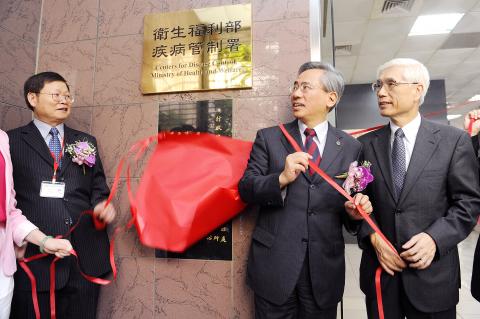The official restructuring of the Department of Health as the Ministry of Health and Welfare was completed yesterday, with the integration of resources and the establishment of the Social and Family Affairs Administration and the Department of Social Insurance being the major changes made, the ministry said.
The Bureau of National Health Insurance has become the National Health Insurance Administration (NHIA) and the Bureau of Health Promotion is now the Health Promotion Administration.
The Centers for Disease Control and the Food and Drug Administration will keep the names, but are now a notch higher in the bureaucratic hierarchy.

Photo: George Tsorng, Taipei Times
Other notable changes are the incorporation of the Social and Family Affairs Administration and the Department of Social Insurance.
The former has integrated the bodies that are in charge of the welfare of women, senior citizens and people with disabilities that were previously under the Ministry of Interior’s Department of Social Affairs, as well as the Child Welfare Bureau, which was also previously under the interior ministry.
The goal of the administration is the implementation of a family and community-centered total care system, the agency said.
The social insurance department, on the other hand, has been restructured to have a better and more comprehensive grip on the three major social insurances, the NHI, the national pension and long-term care insurance.
The integration of resources made possible by the restructuring, among other tasks, is “to break the cycle of poverty-made illness and illness-made poverty and to provide better care for elderly people in an aging society,” the ministry said.
That is to be achieved by strengthening social insurance, developing a long-term care system, building healthcare and welfare clouds for comprehensive care, upgrading medical services in rural areas and connecting the public health and social resources provided at the central level and those at the local level to build an all-encompassing social security network, the ministry said.

A preclearance service to facilitate entry for people traveling to select airports in Japan would be available from Thursday next week to Feb. 25 at Taiwan Taoyuan International Airport, Taoyuan International Airport Corp (TIAC) said on Tuesday. The service was first made available to Taiwanese travelers throughout the winter vacation of 2024 and during the Lunar New Year holiday. In addition to flights to the Japanese cities of Hakodate, Asahikawa, Akita, Sendai, Niigata, Okayama, Takamatsu, Kumamoto and Kagoshima, the service would be available to travelers to Kobe and Oita. The service can be accessed by passengers of 15 flight routes operated by

MORE FALL: An investigation into one of Xi’s key cronies, part of a broader ‘anti-corruption’ drive, indicates that he might have a deep distrust in the military, an expert said China’s latest military purge underscores systemic risks in its shift from collective leadership to sole rule under Chinese President Xi Jinping (習近平), and could disrupt its chain of command and military capabilities, a national security official said yesterday. If decisionmaking within the Chinese Communist Party has become “irrational” under one-man rule, the Taiwan Strait and the regional situation must be approached with extreme caution, given unforeseen risks, they added. The anonymous official made the remarks as China’s Central Military Commission Vice Chairman Zhang Youxia (張又俠) and Joint Staff Department Chief of Staff Liu Zhenli (劉振立) were reportedly being investigated for suspected “serious

ENHANCING EFFICIENCY: The apron can accommodate 16 airplanes overnight at Taoyuan airport while work on the third runway continues, the transport minister said A new temporary overnight parking apron at Taiwan Taoyuan International Airport is to start operating on Friday next week to boost operational efficiency while the third runway is being constructed, the Ministry of Transportation and Communications said yesterday. The apron — one of the crucial projects in the construction of the third runway — can accommodate 16 aircraft overnight at the nation’s largest international airport, Minister of Transportation and Communications Chen Shih-kai (陳世凱) told reporters while inspecting the new facility yesterday morning. Aside from providing the airport operator with greater flexibility in aircraft parking during the third runway construction,

American climber Alex Honnold is to attempt a free climb of Taipei 101 today at 9am, with traffic closures around the skyscraper. To accommodate the climb attempt and filming, the Taipei Department of Transportation said traffic controls would be enforced around the Taipei 101 area. If weather conditions delay the climb, the restrictions would be pushed back to tomorrow. Traffic controls would be in place today from 7am to 11am around the Taipei 101 area, the department said. Songzhi Road would be fully closed in both directions between Songlian Road and Xinyi Road Sec 5, it said, adding that bidirectional traffic controls would